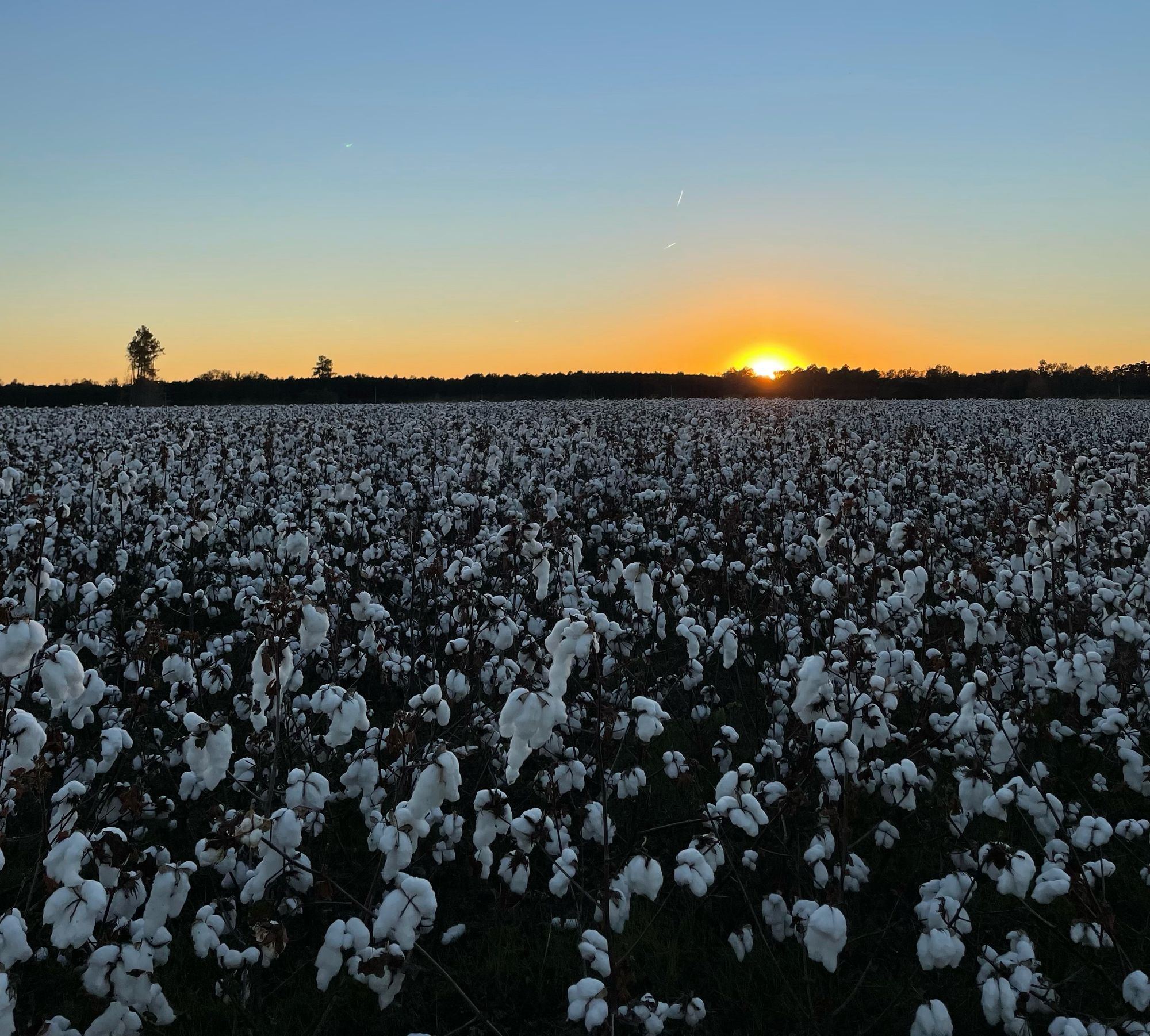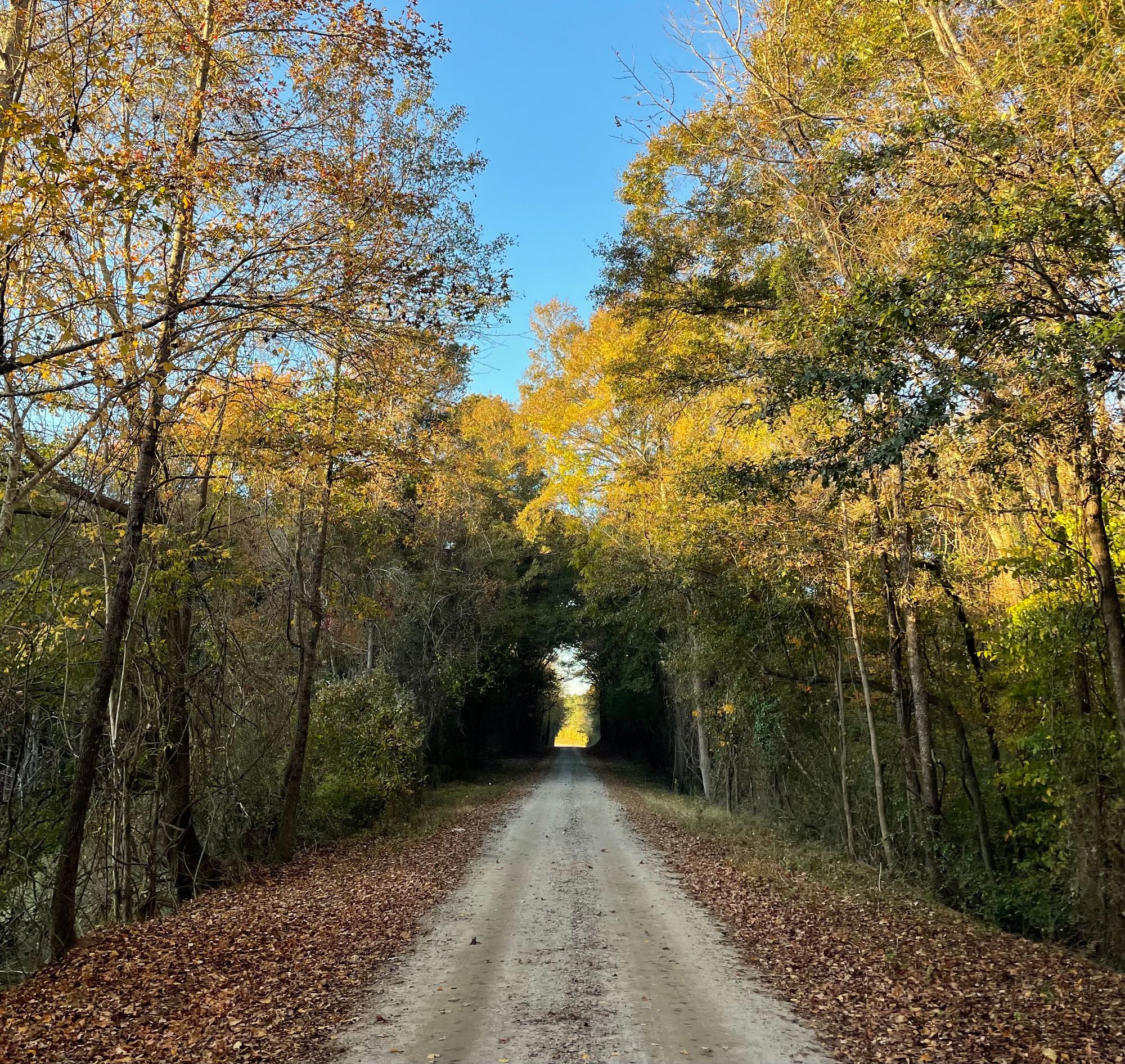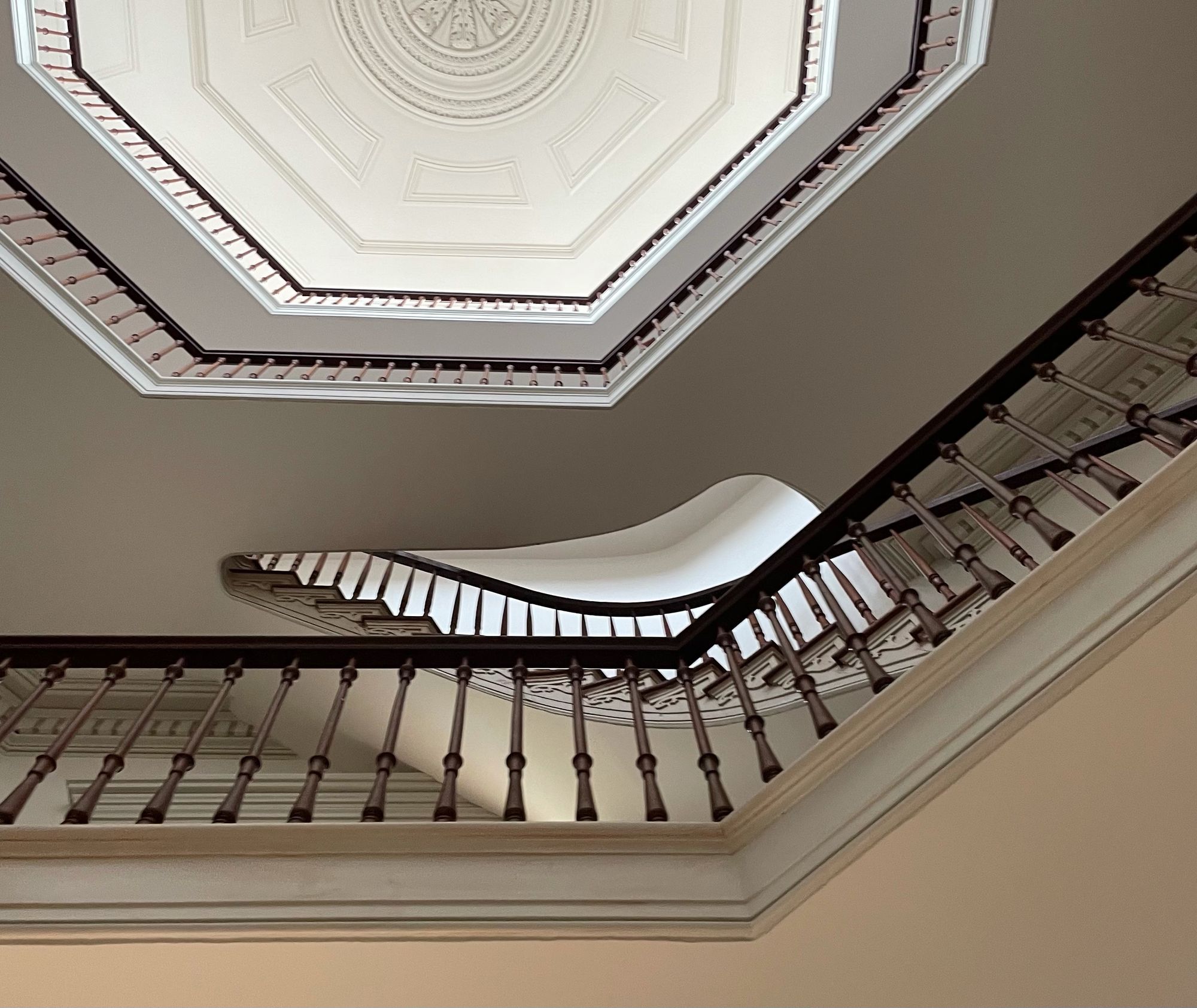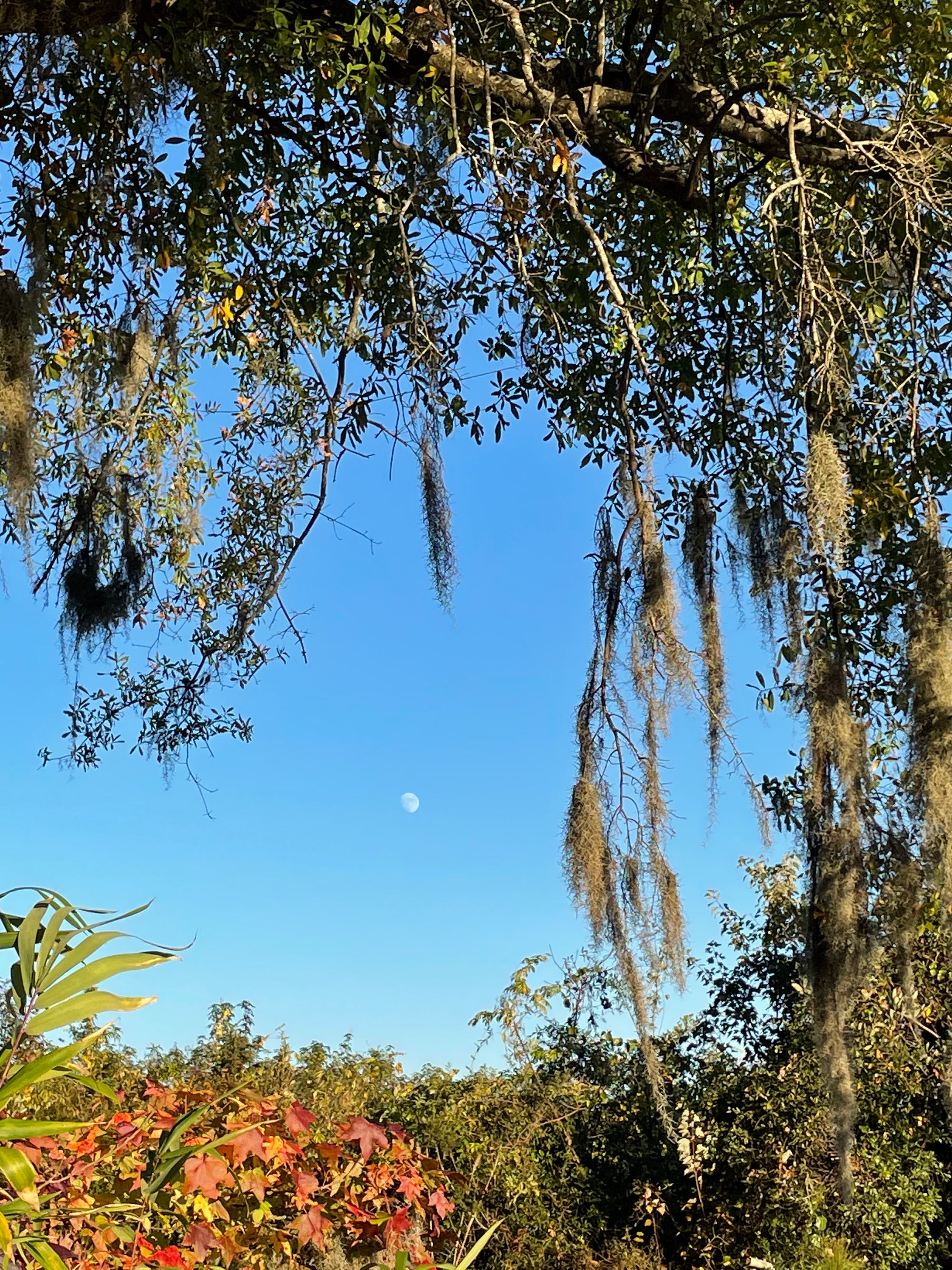the sagging weight of the South
The dense, verdant South is shadows, all shadows.

If there is a form of humor inherent to the American South - and there surely is - it is a humor swollen under the sun, humor ripe with irony so pointed it almost pains, and curdling with a darkness that hovers too near to truth. Compared to the painstaking deliberation with which I sauntered through the other regions of America on this trip, I have zoomed through the South, spent less than a waking day in certain states (much love, Alabama), and even still, that sickly sweet humor has imprinted itself indelibly upon my memory, making no effort to conceal itself as cotton fields and black-watered swamp flit past cracked windshield. It appears in manifestations mundane and overt, sardonic and sartorial. Sometimes you see the humor, if you can bring yourself to call it that, in the state commissioned road signs along the Mississippi Blues Trail, gesturing proudly towards a historic blues joint that is now little more than a dilapidated pile of wooden bones, a victim of government-complicit malnutrition. Other times, that sneering comedy forgets subtlety, like when you pull over at a gas station and to your left, notice an immaculately maintained Confederate cemetery, grey gravestones glistening under grey Veterans Day sky. And then there are the moments where you crane your neck, try to peek through the dense, overhanging foliage, and find nothing funny at all.
One of those moments of humor came in West Point, Mississippi, where deep in a heavy forest, more a tangle of vines than anything else, I found myself before a magnificent Greek Revival structure seemingly lifted from the marsh. Plantations are everywhere down here, they dot the landscape like Waffle Houses adorn the Atlanta suburbs, and the only way to discern between these multitudes is via the style of build or, if you allow yourself to creep closer, by deciphering whether or not the structures that housed enslaved workers still stand and thus, whether shame is a consonant within the language of this particular fiefdom. At the Waverley Plantation, a former working cotton plantation (it is hard to imagine a four-word designation heavier with evil and pain than 'former working cotton plantation'), there were no ramshackle wooden structures, no embrace of anything more complicated than a glorious Antebellum past. And when I got there, it was closed.

Within every man lives two wolves (the desire for spontaneity on a road trip and the desire to not step foot within a Mississippi plantation) and when those wolves bare their teeth at one another, in the form of the sweatpant-clad owner of said plantation extending a warm invitation of a private tour, insurance regulations be damned, you learn pretty quickly that one of the wolves is rabid and the other has a medical condition that prohibits wolf-to-wolf contact of any kind. One wolf slinks away as you slink towards the colonnade.
Perhaps there is no humor of any kind in the South; only heaviness so vast, so tethered to a too-recent past, that all one can do is laugh to excavate the pressure that has formed within the diaphragm. That was how I felt as I was given the express walkthrough of this spectacular testament to opulence - and it was, truly, spectacular, with the most gorgeous cupola I've ever seen, and I have seen many a cupola - and watched the Black day laborers lower their eyes whenever the owner (who, as he made very clear to me, had only bought it a year ago) and I ambled past. I did not laugh, but I did aim a genteel smile in their direction and immediately wished that I had laughed instead because that, at least, would have dripped with less decadent pandering than whatever grimace I had just produced, a bizarre grin that paid homage to these halls and their rich history of villainous condescension. Nor did I laugh when the owner told me with the straightest of faces that the plantation had been built entirely by specialized Irish laborers (constructed from 1840 to 1852...in Mississippi...I think the fuck not). But I couldn't keep the laughter in for long when, while walking back down the oak-lined driveway, he asked me where I had driven from.
"New York, huh?" he turned it over in his mouth, like one of those Sancerres my mom keeps in the garage with a 'DO NOT DRINK' note attached, "My wife and I used to love going there before COVID. But tell me this. Everything I read about New York says that the violent crime up there is out of control. That true?" It's strange meeting someone in the present and knowing exactly who they would have been in the past. This man, regurgitating Tucker Carlson's phlegm by a mist-soaked pond, feet planted on the grounds of a memorial to America's original sin that he had made the conscious decision to own, was little less than an echo of who he would have been a century and a half prior. He would have lived in the same plantation house, been served by people who resembled the people serving him today, but he would have framed his queries heavy with insinuation not as questions but as declaratives, and mercy upon whoever sought to reject the premise. It was spooky, eerie - the past felt much too close - and although I was never even in the neighborhood of danger, the color of my skin and the placid smile painted across my face an impenetrable panacea, the laughter I laughed when I got back in the car was of the deeply nervous kind, imbued with a sinister feeling of having shaken myself free of something that cannot truly be shaken free.

I have never been a skilled subjugator of the self. My friends know this, my professors who begged me to turn in a paper not in danger of capsizing under the weight of personal anecdote know this, and you, whenever you check this site and find yourself reading explorations of my neuroses masquerading as travel entries and wondering when, if ever, we'll move on from the fetishizations of sadness or discomfort and arrive at the local color, know this. And yet one of the greatest gifts this trip has bestowed has been a minimization of the self, a renewed awareness of the countless lives just as (if not more) vibrant as mine that percolate within this rangy country, a grasping of the infinite worlds that multiply endlessly behind lights that flicker on and off in the windows of pre-fab homes and trailer parks and Southwestern adobe. That diminishment has been humbling, ego-reducing, and almost certainly resulted in an ever-so-slight and ever-so-needed marginalization of the self. And that has been useful when darting around hairpin turns on CA-1 that demand every bit of your attention but it is hardly of use here in the South because, for once, to subjugate the self would be an act of wanton callousness.
I have grown talented over these past ten weeks at discerning the distinctions between scenery and connotation. In Arizona, towering buttes conjure a wilder America but that feeling is easy to wake from - there are no more stagecoaches studded with arrows, no iron-jawed cowboys at the Chevron. You can envision Lewis & Clark encamped for winter on the Oregon coast but then you open your eyes and there's guacamole in the gift shop. But in the South, the distinctions between myth and reality are finer, more difficult to distinguish. The imagery of the South that often feels laden with historic cruelty and violence - the stark whites of a cotton field, the low-hanging Spanish moss that does nothing but, well, evoke, the grandiosity of a plantation looming from the undergrowth - well, not only have they been elevated into myth like the cowboy of the plains, but they actually still exist everywhere you turn, continue to constitute a living, breathing economy. And that economy not only continues to take deep, measured inhalations, but it of course draws its oxygen from the same mechanisms of exploitation, changed but not really all that changed from those days of myth. Amongst all that villainy, there I stand, a descendant of the South only a few generations removed, a direct line from the oppression of the past to the privilege of the present. Who am I to feel discomfort upon entering a plantation or striding across a Civil War battlefield when it was quite literally my ancestors, my blood, who willingly enslaved people and held high military rank in the Confederacy? Who am I to feel guilt when it is their wealth, passed down over not much more than a century and a half, that pumps gas into my car and pays for my Whole Foods indulgences? And who I am to feel anything but shame when I try to relegate those thoughts elsewhere? Sometimes, as penance for the subjugation that has been inflicted, the self must not, cannot be subjugated.

The rural South (and I speak of it as if it is some unified concept, when it is, of course, anything but...and yet the country blurs together into one after so long behind the wheel) possesses a physical geography that reinforces the psychology of the place, heightens any sense of complicity with which one might already be wrestling. Roads in the West are wide open, let the wind shake you over the median, and refuse to obfuscate anything. In the Pacific Northwest and the Midwest, there is a regimented order to the worlds you drive through: trees rise vertically, waters end at their boundaries, things are protestant, austere. And yet the dense, verdant South is shadows, all shadows, and claustrophobic tunnels of trees that dangle down, drip over the side of the road. It is not a place to have heaviness hanging over you, because that heaviness can and will assume material form. And then that heaviness will contract, it will constrict, tighter and tighter until all the air is pushed forth from your lungs with a sound that comes horribly close to a laugh.
